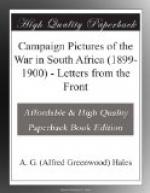On the night of the 28th of July Colonel Harley, Chief Staff Officer Eighth Division, led two companies of the Leinsters and the full strength of the Scots Guards in a night attack on De Villier’s Drift, which was to clear the way for the whole of the Eighth Division towards Fouriesburg. The movement had been well and carefully planned, and was neatly and expeditiously carried out. The following day we advanced in open order over the rolling veldt; now and again a man paused, lurched a little to one side, staggered and fell, as shot and shell dropped amongst us, but the march forward never ceased, never paused Paget and Hunter were with us now, and the lyddite guns seemed to drive all the fight out of the foe. They would not stand. Paget’s artillerymen dashed forward, unlimbered, and loosed on the enemy with a recklessness of personal safety that was almost wanton.
Every branch of the Service was vicing with its neighbour to see who could take the most chances in the game of war, and the very recklessness of the men was their safeguard, for their dash whipped the foe, who now seemed to realise that their evil hour had at last dawned. They sent in a flag of truce, asking for the terms on which they might surrender.
On the evening of the 29th July we knew that the enemy were negotiating for terms of peace, though things were kept as secret as possible until the following day. Then we saw General Prinsloo ride in with his aide and surrender. He met General Rundle first, and a few minutes later General Hunter, and the three leaders rode through the lines together. They were closeted closely for some hours before the final agreement could be arrived at. Prinsloo wanted terms for his men which the British generals would not concede, the final agreement being that the burghers were to ride in and throw down their arms under our flag. They were to be allowed a riding hack to convey them to the railway station, and each man was to remain in possession of his private effects. More than this General Hunter would not concede upon any terms. At one period of the negotiations things became so strained that hostilities were almost renewed, but the Hoof Commandant was wise enough to realise that destiny had decided against him and his burgher band. He came from the conclave at last, and gave an order in Dutch to his aide, and in a moment the horseman was flying towards the Boer laager with the news that, so far as they were concerned, the great war of 1899 and 1900 was at an end.
Our troops had been drawn up in long parallel lines, up over the slopes, over the crest, and along the edge of “Victory Hill.” They formed a lane of blood and steel, down which the conquered veldtsmen had to march. Their guns were on their flanks, the generals grouped in the centre. Everything was hushed and still; there was no sign of braggart triumph, no unseemly mirth, no swagger in the demeanour of the troops. They had worked like men; they




